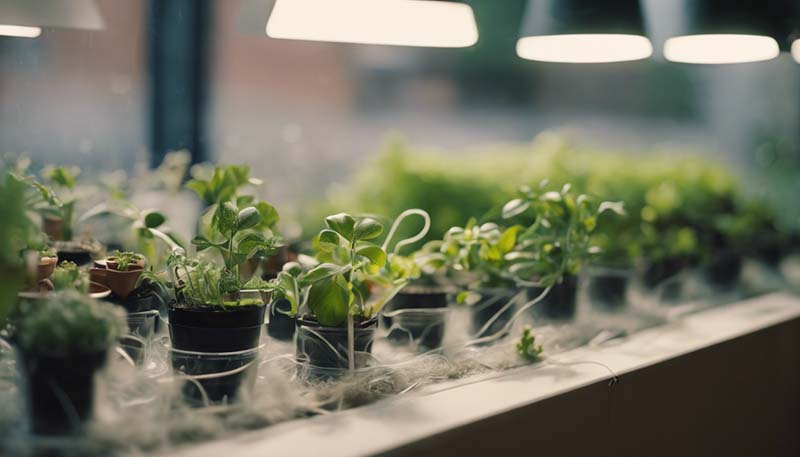The Role of Indoor Gardening in Preventing Illness
As the world becomes more urbanized, people are spending more time indoors, leading to increased concerns about health and well-being. Indoor gardening has emerged as a popular activity that not only enhances the aesthetics of our living spaces but also contributes to our physical and mental health. This article explores the role of indoor gardening in preventing illness and promoting a healthier lifestyle.
Introduction to Indoor Gardening
Indoor gardening refers to the practice of growing plants within an enclosed space, such as a home, office, or greenhouse. Unlike outdoor gardening, it allows individuals to cultivate plants regardless of external weather conditions or geographical limitations. Indoor gardens can include a variety of plants, from small potted herbs to larger, more elaborate arrangements.
Advertisement
Benefits of Indoor Gardening for Health
1. Improved Air Quality
One of the most significant benefits of indoor gardening is its ability to improve air quality. Plants act as natural air purifiers by absorbing carbon dioxide and releasing oxygen through the process of photosynthesis. Additionally, some plants, such as spider plants and peace lilies, are known to filter out common indoor pollutants, including benzene, formaldehyde, and trichloroethylene.
2. Stress Reduction
Gardening has long been associated with stress reduction and relaxation. Tending to plants can provide a calming and therapeutic experience, allowing individuals to escape the pressures of daily life. Studies have shown that gardening can reduce cortisol levels, lower blood pressure, and improve overall mental well-being.
3. Increased Physical Activity
Indoor gardening encourages physical activity, which is essential for maintaining a healthy lifestyle. Activities such as planting, watering, and pruning can help improve cardiovascular health, increase muscle strength, and enhance flexibility. Moreover, the act of bending, stretching, and reaching for plants can serve as a gentle form of exercise, especially for those with limited mobility.
4. Enhanced Cognitive Function
Engaging in indoor gardening can also stimulate cognitive function. The process of planting, nurturing, and observing the growth of plants can help improve memory, concentration, and problem-solving skills. For older adults, gardening can serve as a form of cognitive therapy, potentially delaying the onset of age-related cognitive decline.

5. Social Connection
While indoor gardening can be a solitary activity, it also has the potential to foster social connections. Sharing gardening tips, exchanging plants, and participating in community gardening events can help build relationships and create a sense of belonging. Social interaction is known to have a positive impact on mental health and can help combat feelings of loneliness and isolation.
6. Access to Fresh Produce
Growing your own fruits and vegetables can provide a source of fresh, organic produce, reducing the need for store-bought items that may contain preservatives or pesticides. Consuming fresh produce is linked to a lower risk of chronic diseases, such as heart disease and certain types of cancer.
Challenges and Solutions in Indoor Gardening
1. Limited Space
One of the challenges of indoor gardening is limited space. However, this can be overcome by using vertical gardening techniques, such as hanging planters or wall-mounted shelves, to maximize the available space.
2. Insufficient Light
Natural light is crucial for plant growth, and indoor environments may not provide enough sunlight. This issue can be addressed by using artificial grow lights, which can be adjusted to mimic the natural light spectrum and intensity.
3. Pest Management
Indoor gardens can be susceptible to pests, which can damage plants and spread diseases. Regular monitoring and the use of organic pest control methods, such as introducing beneficial insects or using natural repellents, can help manage pests without harming the plants or the environment.
4. Watering and Humidity
Maintaining the right balance of water and humidity is essential for indoor plants. Overwatering can lead to root rot, while underwatering can cause plants to wilt. Using a moisture meter and adjusting watering schedules based on the specific needs of each plant can help ensure optimal plant health.
Conclusion
Indoor gardening offers numerous health benefits, from improving air quality to reducing stress and promoting physical activity. By addressing common challenges such as limited space and insufficient light, individuals can successfully cultivate indoor gardens that contribute to a healthier lifestyle and help prevent illness. Incorporating indoor gardening into daily life can be a simple yet effective way to enhance overall well-being and create a more sustainable living environment.
Comment